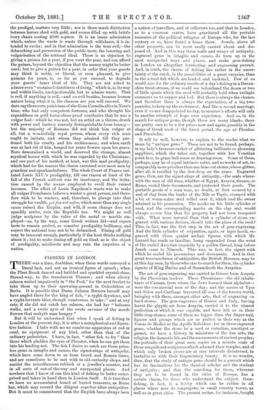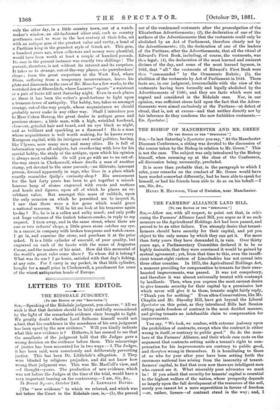FISHING IN LONDON.
THERE was a time, doubtless, when these words conveyed a literal fact, and not an ironical figure of speech ; when the Fleet Brook danced and babbled and sparkled crystal-clear, Strand-way, to the translucent Thames ; and when silvery salmon waited impatiently in "the Pool," for the next freshet to take them up to their spawning-ground in Oxfordshire or Berks. It is possible that Dame Jaliana Berners herself may have angled there for the king of fish, "a ryght deyntous, and a ryght fervente biter, though cumborous to take ;" and at any rate, if she did not catch her salmon, she had her " holsome walke, and a swete ayre of the swete savoure of the meede flowers that makyth man hungry."
Bat it will be understood that when I speak of fishing in London at the present day, it is after a metaphorical and figura- tive fashion. I take with me no cumbrous apparatus of rod or creel, no equipment of any kind, other than that of the ordinary pedestrian. I have, in fact, "other fish to fry" than those which gladden the eyes of Piscator, when he can get them into his landing-net. The fish I desire to catch are those price- less gems in intaglio and cameo, the signet-rings of antiquity, which have come down to us from Greek and Boman times, and are sometimes to be met with in old-curiosity shops, and amidst the miscellaneous rubbish of a jeweller's counter, and in all sorts of out-of the-way, and unexpected places. And nowhere that I know of can this kind of fishing be better enter- prised and taken in hand than in London itself. It is true that we have no accumulated hoard of buried treasures, as Rome has, which may reward the diligent searcher after antiquities. But it must be remembered that the English have always been a nation of travellers, and of collectors toe, and that to London, as to a common centre, have gravitated all the portable treasures of the political refugees of Europe who, for the last century or so, have found a home there. Jewels, above all other property, can be most easily carried about and dis- posed of. And in this way these waifs and strays of antiquity, engraved gems in intaglio and cameo, do turn up in the most unexpected ways and places, and make gem-fishing in London an altogether interesting, and engrossing pursuit. And, in truth, the charm of fishing lies rather in the uncer- tainty of the catch, in the possibilities of a great surprise, than in the actual fish which are landed and basketed. Few of us would care for the ordinary results of a day's fishing in a Devon- shire trout-stream, if we could see beforehand the dozen or two of little sprats which the creel will probably hold when twilight summons us to supper and bed. But there is always the chance, and therefore there is always the expectation, of a big two- pounder, to keep up the excitement. And like a second marriage, even if we are disappointed to-day, to-morrow's efforts will only be another triumph of hope over experience. And so, in the search for antique gems, though there are many blanks, there are pretty sure to be a few prizes now and again, possibly in the shape of Greek work of the finest period, the age of Pheidias and Praxiteles.
It will be well, however, to explain to the reader what we mean by "antique gems." These are not to be found, perhaps, in my lady's treasure-casket of glittering brilliants or gleaming sapphires, which she takes out, together with her Venetian point-lace, to grace ball-room or drawing-room. Some of them, perhaps, may be of equal intrinsic value, and as works of art, in- comparably more priceless than machine-cut stones, whose glitter, after all, is excelled by the dew-drop on the grass. Engraved gems, then, are the signet-rings of antiquity,—the seals where- with the men of old time, whether of Egypt, Assyria, Greece, or Rome, sealed their documents, and protected their goods. The portable goods of a man were, no doubt, at first secured by a seal of clay from the banks of the Nile or Tigris, stamped with a bit of worm-eaten reed rolled over it, which reed the owner retained in his possession. The marks on his little cylinder of reed, and the corresponding marks on the clay seal, would always assure him that his property had not been tampered with. What more natural than that a cylinder of stone, en- graved with various devices, should take the place of the reed ? This, in fact, was the first step in the art of gem-engraving. And the little cylinder of serpentine, agate, or lapis lazuli, en- graved with those quaint archaic figures with which Mr. Layard has made us familiar, hung suspended from the wrist of the curled Assyrian exquisite by a golden thread, long before Jonah came to Nineveh. This was, in fact, the signet with which he sealed his possessions and documents. And in that great treasure-house of antiquities, the British Museum, may be at this day seen, by those who care to search for them, the cylinder signets of King Darius and of Sennacherib the Assyrian.
The art of gem-engraving was carried to Greece from Assyria by the Phcenician traders. These Phoenicians—the old inhabi- tants of Canaan, from whom the Jews learned their alphabet— were the commercial men of the day ; and the navies of Tyre and Sidon and Carthage traversed all seas of the known world, bringing with them, amongst other arts, that of engraving on hard stones. The gem-engravers of Greece and Italy, having learnt the glyptic art from Assyria, carried it to the utmost perfection of which it was capable, and have left us in their little ring-stones, some of them no bigger than the finger-nail, figures and groups which are as perfect in their way as the Venus de Medici or the Apollo Belvidere : for on these engraved gems, whether the stone be a sard or cornelian, amethyst or garnet, we have , a history in miniature of the fine arts, the religion, the domestic life, and the amusements of ancient peoples; the portraits of their great men, copies on a, minute scale of those magnificent sculptures which adorned their temples, and of which only broken pieces are at rare intervals disinterred, to tantalize us with their fragmentary beauty. It is no wonder, then, that the study of antique gems should be a pursuit which has its fascinations for the classical scholar and the student of antiquity ; and that the searching for them, wherever they are to be found in the cities of Europe, has a certain charm, for those who understand the subject. Gem- fishing, in fact, is a hobby which can be ridden in all places where men do congregate, in small country towns, as well as in great cities. The present writer, for instance, bought
only the other day, in a little country town, out of a watch- maker's window, an old-fashioned silver seal, such as country gentlemen used to wear in the last century at their fobs, set with an antique gem of the greatest value and rarity, a head of a Parthiau king in the grandest style of Greek art. This gem, a hundred years ago, when collectors and money were plentiful, would have been worth at least a couple of hundred pounds. Its cost in the present instance was exactly two shillings ! The pursuit, therefore, is not without its interest and its surprises. It takes us to strange, out-of-the-way places,—to pawnbrokers' shops ; from the great emporium at the West End, where Dives, suffering from a temporary inconvenience, leaves his plate and diamonds in the care of Mr. Moss for a few weeks, to the wretched den at Shoreditch, where Lazarus " spouts " a waistcoat or a pair of boots till next Saturday night. Even in such places as these it has been the writer's good-fortune to light upon a treasure-trove of antiquity. The hobby, too, takes us amongst strange, out-of-the-way people, whose acquaintance we should probably never make in any other way. Shall I introduce you to Herr Cohen Herzog, the great dealer in antique gems and precious stones ; a little man, with a high, wrinkled forehead, close-cut, grizzled hair and beard, and an eye black as night, and as brilliant and sparkling as a diamond ? He is a man whose acquaintance is well worth making, for he knows every European capital, with its intrigues and social politics; having, like Ulysses, seen many men and many cities. He is full of information upon all subjects, but overflowing with love for his special hobby, the study of the antique, upon which his opinion is always most valuable. Or will you go with me to an out-of- the-way street in Clerkeuwell, where dwells a man of another stamp, yet devoted to the same pursuit,—an illiterate, ignorant person, dressed apparently in rags, who lives in a place which exactly resembles Quilp's curiosity-shop ? His amusement for the last forty years has been to get together a miscel- laneous heap of stones engraved with crests and mottoes and heads and figures, upon all of which he places an ex- orbitant value. But amongst this mass of rubbish, upon the only occasion on which he permitted me to inspect it, I saw that there were a few gems which would grace a national museum. Will he let me look at his treasures again to-day ? No, be is in a sullen and sulky mood; and only puffs out huge volumes of the foulest tobacco-smoke, in reply to my request. I turn away, and in the same street, where there are one or two refiners' shops, a little green stone catches my eye, in a saucer, in company with broken teaspoons and watch-cases. I go in, and examine the stone, and purchase it at the price asked. It is a little cylinder of emerald, of poor quality, but engraved on each of its facets with the name of Augustus CEesar, and the masters of his mint. How did this memorial of the world's great ruler come there ? To whom did it belong ? What was its use ? I go home, satisfied with that day's fishing, at any rate. For I carry in my pocket, in that little cylinder, bought for a small price in Clerkenwell, a puzzlement for some of the wisest antiquarian heads of Europe.



































 Previous page
Previous page